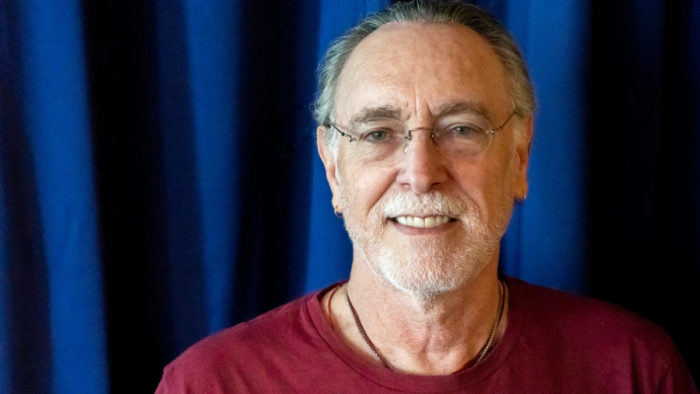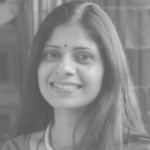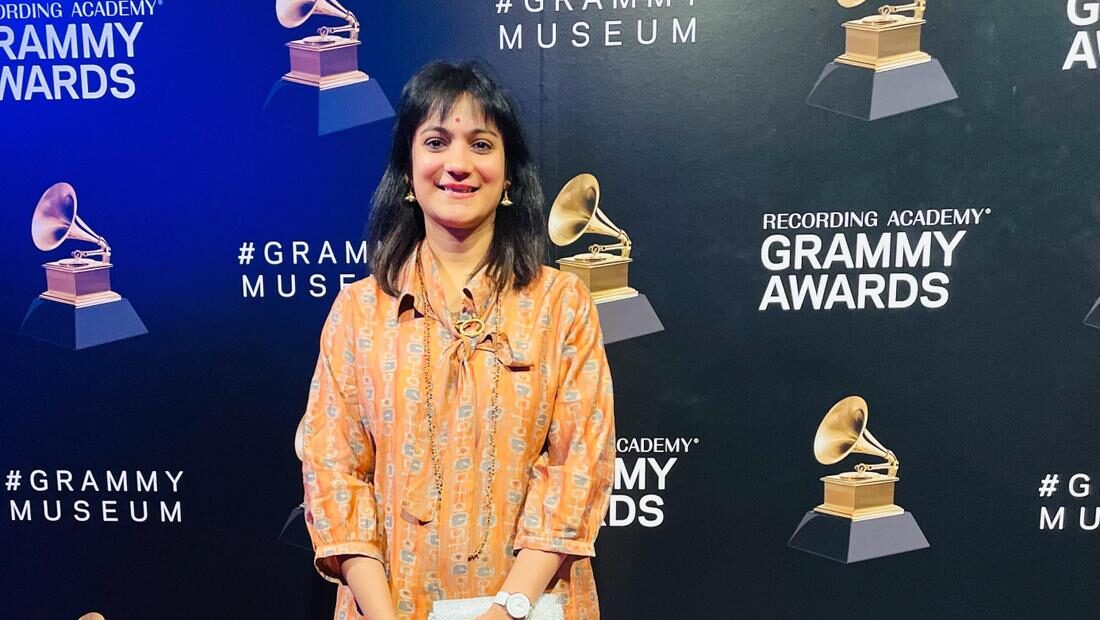Life can turn on a dime, as Americans like to say. Jeffrey Kagel the lead singer of Blue Oyster Cult, an American college band, was to become Krishna Das the most well-known kirtan singer in the West. Even as a young boy, Krishna Das knew the power of the human voice in taking us to a world of sublime beauty and joy.
But there was a difference between the Blues music he enjoyed as a youngster in experimental America and the devotional songs of India. He tells CSP that the seeds for his later transformation were laid in India. “I heard chanting when I arrived in India and I knew immediately that this was a practice that spoke to my heart. I needed a way to open my heart to Devotion and deepen my connection with my Guru.” He says it was like the Blues music of his childhood but to the nth degree.

Krishna Das with Neem Karoli Baba
Krishna Das met Baba Ram Das when he returned to America from his first trip to India in 1968. He spent the late ’60’s traveling across the country as a student of Ram Dass, and in August 1970, he finally made the journey to India, which led him to Ram Dass’ own beloved guru, Neem Karoli Baba, known to most as Maharaj-ji.
Before that he had read all the books that were available at the time, Autobiography of a Yogi, Gospel of Ramakrishna, Zen and Japanese Culture, but his first encounter with Ram Dass was a “right into the bloodstream” kind of experience, he says.

 (Top) A young Krishna Das meditating with Rama Dass (Below) With Ram Dass in 2015 (pic by Phaneuf)
(Top) A young Krishna Das meditating with Rama Dass (Below) With Ram Dass in 2015 (pic by Phaneuf)
“At that moment my whole life changed (when he first met Ram Dass), because I felt my Guru, Neem Karoli Baba immediately when I met Ram Dass. I left for India in August 1970 and met him after arriving in the Kumaon Hills,” says Krishna Das.
Given the name Krishna Das, he began to chant as part of following the path of Bhakti yoga, or the yoga of devotion. After two and a half years with Maharaj-ji, KD returned to USA and sadly six months later received the news that his Guru had died.
Krishna Das found solace in the music of the East and would also appreciate the music of his heroes like Ray Charles, Van Morrison, Steely Dan, and Bruce Springsteen (whom he laughingly calls “the Bodhisattva of New Jersey”). He co-founded Triloka Records, a California-based label specializing in world music, releasing such artists as Jai Uttal, sarod virtuoso Ali Akbar Khan, and legendary jazz musician/composer Jackie McLean.
 A kirtan session (pic by D J Pierce)
A kirtan session (pic by D J Pierce)
In 1994, he started leading chant sessions at Jivamukti Yoga Center, NYC, and soon grew to near cult status all over the world not different from his rock star friends. In February 2013, he performed at the Grammy awards in Los Angeles when his album Live Ananda was nominated in the Best New Age Album category.
Kirtans however are no New Age phenomenon. They have been in India since the 12th century and have been a vehicle for the expression of Bhakti. It is a call and response musical form which celebrates the Divine and has been an integral part of the oral tradition of India. The kirtans sung in India are longer and with more sahitya than they are in the West and are usually accompanied by traditional instruments including the table or mridangam. In the West, musicians have used a range of instruments with Krishna Das using the harmonium to accompany the voice.

Krishna Das with fans in Mumbai
While most kirtans in India are set to ragas, Krishna Das says that he tunes the music intuitively based on his own “garage band rock and roll” strengths. He is backed by great music producers who give his voice the artistic space that it needs and take it to another level with modern technology.
For one CD with Rick Rubin, a top class producer, Krishna Das rented a studio in Los Angeles which used to be Ocean Way Studios where Frank Sinatra recorded his biggest albums. Rubin would take care of the seating of the musicians, the overdubs added to the albums including the Cello, violin and some keyboards.
While the albums are created in the same manner as those of the best in the business, Krishna Das has said, “I'm not aiming to create a hit song. I don't even know what a hit song would be in my case. I'm not singing for other people. I'm chanting to save my own heart, my own life, and to stay centered and to try to remember what this is all about. So, I could never sit around and try to come up with something that I think would appeal to a lot of people in that way.”
As to what attracted him to chanting, Krishna says that at first hearing he could see that people were giving of themselves 100 per cent while chanting. He was 23 years old at that time and describes himself as being ‘neurotic’ with a tendency to hold himself back. “I knew that this was the path to get past that place in myself,” he has said. “Through the repetition of these names, people in India say that that place within us which houses the divine is uncovered. It is within us but we don’t know where to see. People say the sound of these names is actually the divine form itself, it is the vibration form of the deity. It is what the deities have left for us in the vibrational form and it is not different from who we are. Om is the first sound. A is the impetus for all creation. Um ties it all up. It is the totality of all vibration if we could hear it all at once,” he has told in an interview.

Chanting the name of the deities are magical formula that are good for only one thing – real love, truth, peace says Krishna Das. “If it wasn’t these mantras that I was singing, even though any other music would be inspiring, opening and grounding, my belief is that it would not be enough in the long run. The repetition of these mantras destroys the delusion that we are separate beings. The practice of repetition of this name, liberates us from the planet of me.”
CSP asked him about the challenges confronting America today, and how yoga and chanting can help keep communities together. “The whole world is facing terrible suffering and challenges right now. People are being forced to look at their own minds. It is in the mind that suffering exists. So on one hand it is a great opportunity to recognize that and try find a way to live with inner peace, regardless of what is happening in the outside world,” says Krishna Das.
And which is his favourite kirtan... “All the Names of God are the names of the One who lives within us as out True Self,” says Krishna Das. No singer song writer in the US, however famous, could have put it more beautifully.





